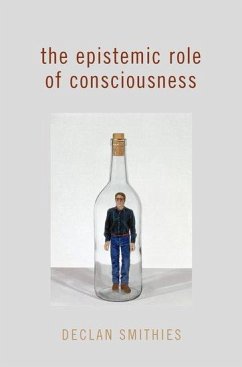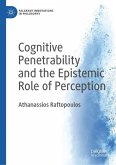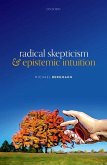Declan Smithies
The Epistemic Role of Consciousness
Declan Smithies
The Epistemic Role of Consciousness
- Gebundenes Buch
- Merkliste
- Auf die Merkliste
- Bewerten Bewerten
- Teilen
- Produkt teilen
- Produkterinnerung
- Produkterinnerung
In this volume, Declan Smithies argues that consciousness has unique epistemic significance in the sense that only conscious creatures have epistemic justification to know anything about the world. In other words, all epistemic justification depends ultimately on consciousness.
Andere Kunden interessierten sich auch für
![Cognitive Penetrability and the Epistemic Role of Perception Cognitive Penetrability and the Epistemic Role of Perception]() Athanassios RaftopoulosCognitive Penetrability and the Epistemic Role of Perception58,99 €
Athanassios RaftopoulosCognitive Penetrability and the Epistemic Role of Perception58,99 €![Radical Skepticism and Epistemic Intuition Radical Skepticism and Epistemic Intuition]() Michael BergmannRadical Skepticism and Epistemic Intuition112,99 €
Michael BergmannRadical Skepticism and Epistemic Intuition112,99 €![The A Priori and Its Role in Philosophy The A Priori and Its Role in Philosophy]() The A Priori and Its Role in Philosophy59,00 €
The A Priori and Its Role in Philosophy59,00 €![Epistemic Injustice Epistemic Injustice]() Miranda FrickerEpistemic Injustice32,99 €
Miranda FrickerEpistemic Injustice32,99 €![Epistemic Courage Epistemic Courage]() Jonathan IchikawaEpistemic Courage121,99 €
Jonathan IchikawaEpistemic Courage121,99 €![Groups as Epistemic and Moral Agents Groups as Epistemic and Moral Agents]() Jessica BrownGroups as Epistemic and Moral Agents103,99 €
Jessica BrownGroups as Epistemic and Moral Agents103,99 €![Education's Epistemology Education's Epistemology]() Harvey SiegelEducation's Epistemology154,99 €
Harvey SiegelEducation's Epistemology154,99 €-
-
-
In this volume, Declan Smithies argues that consciousness has unique epistemic significance in the sense that only conscious creatures have epistemic justification to know anything about the world. In other words, all epistemic justification depends ultimately on consciousness.
Hinweis: Dieser Artikel kann nur an eine deutsche Lieferadresse ausgeliefert werden.
Hinweis: Dieser Artikel kann nur an eine deutsche Lieferadresse ausgeliefert werden.
Produktdetails
- Produktdetails
- Verlag: Oxford University Press
- Seitenzahl: 456
- Erscheinungstermin: 2. September 2019
- Englisch
- Abmessung: 239mm x 157mm x 43mm
- Gewicht: 748g
- ISBN-13: 9780199917662
- ISBN-10: 0199917663
- Artikelnr.: 55388290
- Herstellerkennzeichnung
- Libri GmbH
- Europaallee 1
- 36244 Bad Hersfeld
- gpsr@libri.de
- Verlag: Oxford University Press
- Seitenzahl: 456
- Erscheinungstermin: 2. September 2019
- Englisch
- Abmessung: 239mm x 157mm x 43mm
- Gewicht: 748g
- ISBN-13: 9780199917662
- ISBN-10: 0199917663
- Artikelnr.: 55388290
- Herstellerkennzeichnung
- Libri GmbH
- Europaallee 1
- 36244 Bad Hersfeld
- gpsr@libri.de
Declan Smithies is Professor of Philosophy at the Ohio State University. He works primarily on issues at the intersection between epistemology and the philosophy of mind. He is co-editor of Introspection and Consciousness (OUP, 2012) and Attention: Philosophical and Psychological Essays (OUP 2011).
0.0: Introduction
0.1. What is Consciousness?
0.2: The Significance of Consciousness
0.3. The Hard Problem of Consciousness
0.4: Putting Consciousness First
0.5: An Overview of this Book
0.6: Chapter Summaries
PART I
1: Representation
1.1: Representationalism
1.2: Unconscious Mental Representation
1.3. Grounding Representation in Consciousness
1.4: Grounding Thought in Consciousness
1.5: Grounding Epistemic Justification in Consciousness
2: Perception
2.1: Blindsight
2.2: Concepts of Consciousness
2.3: Presentational Force
2.4: Skeptical Scenarios
2.5. Duplication Scenarios
2.6: Conclusions
3: Cognition
3.1: The Epistemic Role of Belief
3.2. Beliefs and Subdoxastic States
3.3: Inferential Integration
3.4: Conscious Accessibility
3.5: The Cognitive Experience of Judgment
3.6: Conclusions
4: Introspection
4.1: The Simple Theory of Introspection
4.2: The Reliability Challenge
4.3: Rationality and Self-Knowledge
4.4: The Scope Question
4.5: The Role of Conscious Judgment
4.6: Conclusions
5: Mentalism
5.1: Evidentialism
5.2: Mentalism
5.3: Phenomenal Mentalism
5.4: The Phenomenal Conception of Evidence
5.5: The Explanatory Challenge
PART II
6: Accessibilism
6.1: What is Accessibilism?
6.2: Explaining Accessibilism
6.3: Clairvoyance and Super-Blindsight
6.4: The New Evil Demon Problem
6.5: Answering the Explanatory Challenge
7: Reflection
7.1: Justification and Reflection
7.2: An Argument from Reflection
7.3: The Over-Intellectualization Problem
7.4: The Regress Problem
7.5: The Empirical Problem
7.6: The Value Problem
7.7: Conclusions
8: Epistemic Akrasia
8.1: What is Epistemic Akrasia?
8.2: An Argument from Epistemic Akrasia
8.3: Moore's Paradox
8.4: Knowledge as the Aim of Belief
8.5: Justification and Reflection
9: Higher-Order Evidence
9.1: A Puzzle About Epistemic Akrasia
9.2: Solving the Puzzle
9.3: The Certainty Argument
9.4: Ideally Rational Agents
9.5: Rational Dilemmas
9.6: Epistemic Idealization
10: Luminosity
10.1: Luminosity Defined
10.2: The Problem of the Speckled Hen
10.3: The Anti-Luminosity Argument
10.4: Epistemic Iteration Principles
10.5: The Puzzle of the Unmarked Clock
10.6: What's at Stake?
11: Conclusion
11.1: Phenomenal Conservatism
11.2: Seemings
11.3: Problems about Evidence
11.4: Problems about Evidential Support
11.5: Phenomenal Accessibilism
11.6: Conclusions
0.1. What is Consciousness?
0.2: The Significance of Consciousness
0.3. The Hard Problem of Consciousness
0.4: Putting Consciousness First
0.5: An Overview of this Book
0.6: Chapter Summaries
PART I
1: Representation
1.1: Representationalism
1.2: Unconscious Mental Representation
1.3. Grounding Representation in Consciousness
1.4: Grounding Thought in Consciousness
1.5: Grounding Epistemic Justification in Consciousness
2: Perception
2.1: Blindsight
2.2: Concepts of Consciousness
2.3: Presentational Force
2.4: Skeptical Scenarios
2.5. Duplication Scenarios
2.6: Conclusions
3: Cognition
3.1: The Epistemic Role of Belief
3.2. Beliefs and Subdoxastic States
3.3: Inferential Integration
3.4: Conscious Accessibility
3.5: The Cognitive Experience of Judgment
3.6: Conclusions
4: Introspection
4.1: The Simple Theory of Introspection
4.2: The Reliability Challenge
4.3: Rationality and Self-Knowledge
4.4: The Scope Question
4.5: The Role of Conscious Judgment
4.6: Conclusions
5: Mentalism
5.1: Evidentialism
5.2: Mentalism
5.3: Phenomenal Mentalism
5.4: The Phenomenal Conception of Evidence
5.5: The Explanatory Challenge
PART II
6: Accessibilism
6.1: What is Accessibilism?
6.2: Explaining Accessibilism
6.3: Clairvoyance and Super-Blindsight
6.4: The New Evil Demon Problem
6.5: Answering the Explanatory Challenge
7: Reflection
7.1: Justification and Reflection
7.2: An Argument from Reflection
7.3: The Over-Intellectualization Problem
7.4: The Regress Problem
7.5: The Empirical Problem
7.6: The Value Problem
7.7: Conclusions
8: Epistemic Akrasia
8.1: What is Epistemic Akrasia?
8.2: An Argument from Epistemic Akrasia
8.3: Moore's Paradox
8.4: Knowledge as the Aim of Belief
8.5: Justification and Reflection
9: Higher-Order Evidence
9.1: A Puzzle About Epistemic Akrasia
9.2: Solving the Puzzle
9.3: The Certainty Argument
9.4: Ideally Rational Agents
9.5: Rational Dilemmas
9.6: Epistemic Idealization
10: Luminosity
10.1: Luminosity Defined
10.2: The Problem of the Speckled Hen
10.3: The Anti-Luminosity Argument
10.4: Epistemic Iteration Principles
10.5: The Puzzle of the Unmarked Clock
10.6: What's at Stake?
11: Conclusion
11.1: Phenomenal Conservatism
11.2: Seemings
11.3: Problems about Evidence
11.4: Problems about Evidential Support
11.5: Phenomenal Accessibilism
11.6: Conclusions
0.0: Introduction
0.1. What is Consciousness?
0.2: The Significance of Consciousness
0.3. The Hard Problem of Consciousness
0.4: Putting Consciousness First
0.5: An Overview of this Book
0.6: Chapter Summaries
PART I
1: Representation
1.1: Representationalism
1.2: Unconscious Mental Representation
1.3. Grounding Representation in Consciousness
1.4: Grounding Thought in Consciousness
1.5: Grounding Epistemic Justification in Consciousness
2: Perception
2.1: Blindsight
2.2: Concepts of Consciousness
2.3: Presentational Force
2.4: Skeptical Scenarios
2.5. Duplication Scenarios
2.6: Conclusions
3: Cognition
3.1: The Epistemic Role of Belief
3.2. Beliefs and Subdoxastic States
3.3: Inferential Integration
3.4: Conscious Accessibility
3.5: The Cognitive Experience of Judgment
3.6: Conclusions
4: Introspection
4.1: The Simple Theory of Introspection
4.2: The Reliability Challenge
4.3: Rationality and Self-Knowledge
4.4: The Scope Question
4.5: The Role of Conscious Judgment
4.6: Conclusions
5: Mentalism
5.1: Evidentialism
5.2: Mentalism
5.3: Phenomenal Mentalism
5.4: The Phenomenal Conception of Evidence
5.5: The Explanatory Challenge
PART II
6: Accessibilism
6.1: What is Accessibilism?
6.2: Explaining Accessibilism
6.3: Clairvoyance and Super-Blindsight
6.4: The New Evil Demon Problem
6.5: Answering the Explanatory Challenge
7: Reflection
7.1: Justification and Reflection
7.2: An Argument from Reflection
7.3: The Over-Intellectualization Problem
7.4: The Regress Problem
7.5: The Empirical Problem
7.6: The Value Problem
7.7: Conclusions
8: Epistemic Akrasia
8.1: What is Epistemic Akrasia?
8.2: An Argument from Epistemic Akrasia
8.3: Moore's Paradox
8.4: Knowledge as the Aim of Belief
8.5: Justification and Reflection
9: Higher-Order Evidence
9.1: A Puzzle About Epistemic Akrasia
9.2: Solving the Puzzle
9.3: The Certainty Argument
9.4: Ideally Rational Agents
9.5: Rational Dilemmas
9.6: Epistemic Idealization
10: Luminosity
10.1: Luminosity Defined
10.2: The Problem of the Speckled Hen
10.3: The Anti-Luminosity Argument
10.4: Epistemic Iteration Principles
10.5: The Puzzle of the Unmarked Clock
10.6: What's at Stake?
11: Conclusion
11.1: Phenomenal Conservatism
11.2: Seemings
11.3: Problems about Evidence
11.4: Problems about Evidential Support
11.5: Phenomenal Accessibilism
11.6: Conclusions
0.1. What is Consciousness?
0.2: The Significance of Consciousness
0.3. The Hard Problem of Consciousness
0.4: Putting Consciousness First
0.5: An Overview of this Book
0.6: Chapter Summaries
PART I
1: Representation
1.1: Representationalism
1.2: Unconscious Mental Representation
1.3. Grounding Representation in Consciousness
1.4: Grounding Thought in Consciousness
1.5: Grounding Epistemic Justification in Consciousness
2: Perception
2.1: Blindsight
2.2: Concepts of Consciousness
2.3: Presentational Force
2.4: Skeptical Scenarios
2.5. Duplication Scenarios
2.6: Conclusions
3: Cognition
3.1: The Epistemic Role of Belief
3.2. Beliefs and Subdoxastic States
3.3: Inferential Integration
3.4: Conscious Accessibility
3.5: The Cognitive Experience of Judgment
3.6: Conclusions
4: Introspection
4.1: The Simple Theory of Introspection
4.2: The Reliability Challenge
4.3: Rationality and Self-Knowledge
4.4: The Scope Question
4.5: The Role of Conscious Judgment
4.6: Conclusions
5: Mentalism
5.1: Evidentialism
5.2: Mentalism
5.3: Phenomenal Mentalism
5.4: The Phenomenal Conception of Evidence
5.5: The Explanatory Challenge
PART II
6: Accessibilism
6.1: What is Accessibilism?
6.2: Explaining Accessibilism
6.3: Clairvoyance and Super-Blindsight
6.4: The New Evil Demon Problem
6.5: Answering the Explanatory Challenge
7: Reflection
7.1: Justification and Reflection
7.2: An Argument from Reflection
7.3: The Over-Intellectualization Problem
7.4: The Regress Problem
7.5: The Empirical Problem
7.6: The Value Problem
7.7: Conclusions
8: Epistemic Akrasia
8.1: What is Epistemic Akrasia?
8.2: An Argument from Epistemic Akrasia
8.3: Moore's Paradox
8.4: Knowledge as the Aim of Belief
8.5: Justification and Reflection
9: Higher-Order Evidence
9.1: A Puzzle About Epistemic Akrasia
9.2: Solving the Puzzle
9.3: The Certainty Argument
9.4: Ideally Rational Agents
9.5: Rational Dilemmas
9.6: Epistemic Idealization
10: Luminosity
10.1: Luminosity Defined
10.2: The Problem of the Speckled Hen
10.3: The Anti-Luminosity Argument
10.4: Epistemic Iteration Principles
10.5: The Puzzle of the Unmarked Clock
10.6: What's at Stake?
11: Conclusion
11.1: Phenomenal Conservatism
11.2: Seemings
11.3: Problems about Evidence
11.4: Problems about Evidential Support
11.5: Phenomenal Accessibilism
11.6: Conclusions








